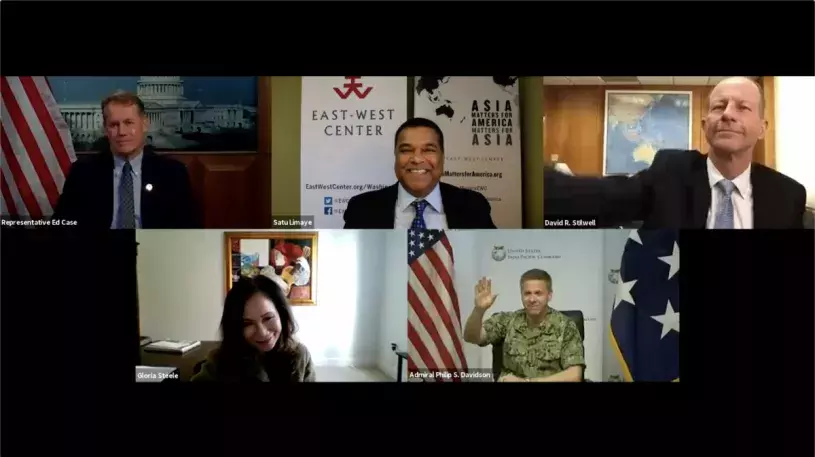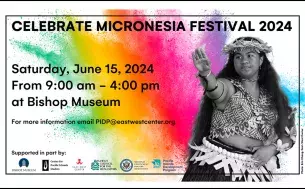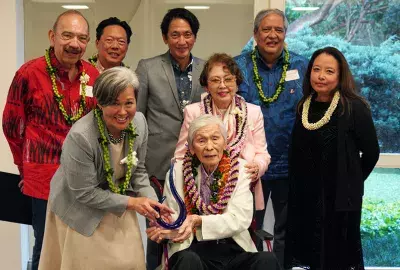Error message

OFFICE/DEPARTMENT
WASHINGTON, DC (Nov. 25, 2020) – The East-West Center hosted The United States’ Enhanced & Enduring Commitment to the Pacific Islands Region on Thursday, November 19, 2020, a high-profile event featuring six high-ranking US government officials discussing the longstanding US partnership with the Pacific Islands region from development, diplomatic, military, and congressional policy perspectives.
Special guest speakers included John Barsa, Acting Deputy Administrator (USAID), US Representative Michael T. McCaul (TX-10), Admiral Philip S. Davidson (US Indo-Pacific Command, or USINDOPACOM), US Representative and Pacific Islands Caucus Co-Chair Ed Case (HI-1), Assistant Secretary of State for the Bureau of East Asian and Pacific Affairs David R. Stilwell, and Gloria D. Steele, Deputy Assistant Administrator for Asia (USAID). Each of the panelists highlighted shared interests and values between the US, the Pacific Islands, and various countries in the Indo-Pacific. Special focus was given to numerous current US projects to support the economic development, sovereignty, security, and good governance of the Pacific Islands in the face of challenges posed by the People’s Republic of China, climate change, and post-COVID economic recovery.
Acting Deputy Administrator Barsa delivered opening remarks discussing USAID’s work in the region, including a number of new grants and initiatives focused on natural disaster resiliency, transparency, infrastructure financing, private sector-led growth, good governance, and sustainable development. “We are so thankful to collaborate with partners in the Pacific like Australia, Japan, New Zealand, South Korea, and Taiwan who have similar goals to advance a free and open Indo-Pacific,” said Barsa, “Together, we believe in the promise of transparent and inclusive development.”
US Representative McCaul then delivered remarks focused on the impact of COVID-19 and regional geopolitical challenges, highlighting legislation like the BUILD Act and the work of the China Task Force. “We often forget the United States is also a Pacific nation, and American soil does not stop at the California coast, but extends all the way to Guam,” said McCaul.
Admiral Davidson then discussed USINDOPACOM efforts to support the Pacific Islands in facing current and future security challenges including maritime exercises and advisory support, as well as praise for the National Defense Authorization Act. “Nations that have like values and a mutual interest in their prosperity and their security should be working together in order to defend those freedoms,” said Davidson, “It’s been the privilege of a lifetime for me personally to work alongside our Pacific allies and partners.”
“The United States has been, is, and will remain a Pacific country,” US Representative Case said, echoing fellow representative McCaul’s statement. Case went on to describe bipartisan congressional support for the Pacific Islands Caucus, of which he is the founding co-chair, and the BLUE Pacific Act, a bipartisan bill that establishes a comprehensive US foreign policy for the Pacific Islands focused on security, development, and shared values.
Addressing the US diplomatic approach to the Pacific Islands, Assistant Secretary Stilwell praised the work of the US Congress and USINDOPACOM and went on to highlight the civil society and human capital development links between the US and the Pacific Islands region. He echoed Representative McCaul and Admiral Davidson’s statements regarding China’s impacts on regional economic stability with its One Belt One Road program. “America is at its best when we are competing and we are in full competition now as we demonstrate the benefits of a free, open, democratic system of governance free of corruption,” said Stilwell.
Deputy Assistant Administrator Steele of USAID expanded on Acting Deputy Administrator Barsa’s earlier remarks, elaborating on how the US complements the work of regional partners like Australia, Japan, New Zealand, South Korea, and Taiwan to support development in the Pacific Islands. “What we do is work to make the [Pacific Island] countries become more self-reliant. We want them to be able to plan, finance, and implement their programs,” said Steele, “We want them to be able to have a choice of the development trajectory that they take.”
East-West Center Vice President Satu Limaye, who served as moderator for the program, closed the event with an announcement of upcoming Center initiatives related to the Pacific Islands planned for 2021. “The East-West Center has a long record of engaging the peoples and governments of the Pacific Islands countries to enhance education, exchange, and collaborative research,” said Limaye, “We will further advance our efforts by publishing a Pacific Islands Matters for America/America Matters for the Pacific Islands report and a new Congressional Staff Program on the Pacific Islands region.”
More than 300 people affiliated with the US government, civil society, academia, and the media attended the livestreamed event on Zoom and YouTube. The event recording is available on Vimeo, YouTube, and SoundCloud.
WASHINGTON, DC (Nov. 25, 2020) – The East-West Center hosted The United States’ Enhanced & Enduring Commitment to the Pacific Islands Region on Thursday, November 19, 2020, a high-profile event featuring six high-ranking US government officials discussing the longstanding US partnership with the Pacific Islands region from development, diplomatic, military, and congressional policy perspectives.
Special guest speakers included John Barsa, Acting Deputy Administrator (USAID), US Representative Michael T. McCaul (TX-10), Admiral Philip S. Davidson (US Indo-Pacific Command, or USINDOPACOM), US Representative and Pacific Islands Caucus Co-Chair Ed Case (HI-1), Assistant Secretary of State for the Bureau of East Asian and Pacific Affairs David R. Stilwell, and Gloria D. Steele, Deputy Assistant Administrator for Asia (USAID). Each of the panelists highlighted shared interests and values between the US, the Pacific Islands, and various countries in the Indo-Pacific. Special focus was given to numerous current US projects to support the economic development, sovereignty, security, and good governance of the Pacific Islands in the face of challenges posed by the People’s Republic of China, climate change, and post-COVID economic recovery.
Acting Deputy Administrator Barsa delivered opening remarks discussing USAID’s work in the region, including a number of new grants and initiatives focused on natural disaster resiliency, transparency, infrastructure financing, private sector-led growth, good governance, and sustainable development. “We are so thankful to collaborate with partners in the Pacific like Australia, Japan, New Zealand, South Korea, and Taiwan who have similar goals to advance a free and open Indo-Pacific,” said Barsa, “Together, we believe in the promise of transparent and inclusive development.”
US Representative McCaul then delivered remarks focused on the impact of COVID-19 and regional geopolitical challenges, highlighting legislation like the BUILD Act and the work of the China Task Force. “We often forget the United States is also a Pacific nation, and American soil does not stop at the California coast, but extends all the way to Guam,” said McCaul.
Admiral Davidson then discussed USINDOPACOM efforts to support the Pacific Islands in facing current and future security challenges including maritime exercises and advisory support, as well as praise for the National Defense Authorization Act. “Nations that have like values and a mutual interest in their prosperity and their security should be working together in order to defend those freedoms,” said Davidson, “It’s been the privilege of a lifetime for me personally to work alongside our Pacific allies and partners.”
“The United States has been, is, and will remain a Pacific country,” US Representative Case said, echoing fellow representative McCaul’s statement. Case went on to describe bipartisan congressional support for the Pacific Islands Caucus, of which he is the founding co-chair, and the BLUE Pacific Act, a bipartisan bill that establishes a comprehensive US foreign policy for the Pacific Islands focused on security, development, and shared values.
Addressing the US diplomatic approach to the Pacific Islands, Assistant Secretary Stilwell praised the work of the US Congress and USINDOPACOM and went on to highlight the civil society and human capital development links between the US and the Pacific Islands region. He echoed Representative McCaul and Admiral Davidson’s statements regarding China’s impacts on regional economic stability with its One Belt One Road program. “America is at its best when we are competing and we are in full competition now as we demonstrate the benefits of a free, open, democratic system of governance free of corruption,” said Stilwell.
Deputy Assistant Administrator Steele of USAID expanded on Acting Deputy Administrator Barsa’s earlier remarks, elaborating on how the US complements the work of regional partners like Australia, Japan, New Zealand, South Korea, and Taiwan to support development in the Pacific Islands. “What we do is work to make the [Pacific Island] countries become more self-reliant. We want them to be able to plan, finance, and implement their programs,” said Steele, “We want them to be able to have a choice of the development trajectory that they take.”
East-West Center Vice President Satu Limaye, who served as moderator for the program, closed the event with an announcement of upcoming Center initiatives related to the Pacific Islands planned for 2021. “The East-West Center has a long record of engaging the peoples and governments of the Pacific Islands countries to enhance education, exchange, and collaborative research,” said Limaye, “We will further advance our efforts by publishing a Pacific Islands Matters for America/America Matters for the Pacific Islands report and a new Congressional Staff Program on the Pacific Islands region.”
More than 300 people affiliated with the US government, civil society, academia, and the media attended the livestreamed event on Zoom and YouTube. The event recording is available on Vimeo, YouTube, and SoundCloud.







